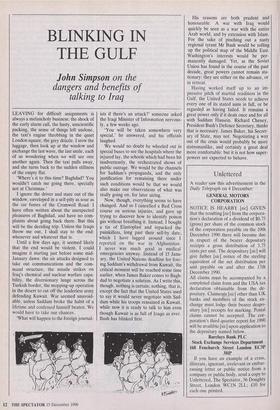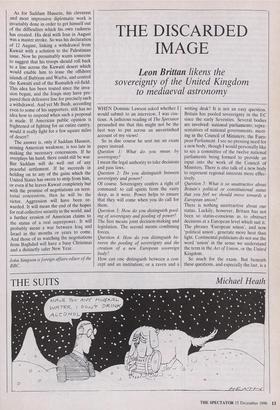BLINKING IN THE GULF
John Simpson on the
dangers and benefits of talking to Iraq
LEAVING for difficult assignments is always a melancholy business: the shock of the early alarm call, the hasty, unscientific packing, the sense of things left undone, the taxi's engine throbbing in the quiet London square, the grey drizzle. I stow the luggage, then look up at the window and exchange the last wave, the last smile, each of us wondering when we will see one another again. Then the taxi pulls away, and she turns back to the sudden stillness of the empty flat.
'Where's it to this time? Baghdad? You wouldn't catch me going there, specially not at Christmas.'
I ignore the driver and stare out of the window, enveloped in a self-pity as sour as the car fumes of the Cromwell Road. I have often written about the unexpected pleasures of Baghdad, and have no com- plaints about going back there. But this will be the deciding trip. Unless the Iraqis throw me out, I shall stay to the end: whenever and whatevek that is.
Until a few days ago, it seemed likely that the end would be violent. I could imagine it starting just before some mid- January dawn: the air attacks designed to take out communications and the com- mand structure, the missile strikes on Iraq's chemical and nuclear warfare capa- bility, the diversionary lunge across the Turkish border, the mopping-up operation in the desert to cut off the leaderless army defending Kuwait. War seemed unavoid- able, unless Saddam broke the habit of a lifetime and confessed himself beaten. We would have to take our chances.
'What will happen to the foreign journal- ists if there's an attack?' someone asked the Iraqi Minister of Information nervous- ly, a few weeks ago.
'You will be taken somewhere very special,' he answered, and his officials laughed.
We would no doubt be wheeled out in special buses to see the hospitals where the injured lay, the schools which had been hit inadvertently, the orchestrated shows of public outrage. We would be the channels for Saddam's propaganda, and the only justification for remaining there under such conditions would be that we would also make our observations of what was really going on, for later airing.
Now, though, everything seems to have changed. And so I cancelled a Red Cross course on serious injuries, and gave up trying to discover how to identify poison gas without breathing it. Instead, I bought a tin of Elastoplast and repacked the painkillers, long past their sell-by date, which I have lugged around since I reported on the war in Afghanistan. I never was much good in medical emergencies anyway. Instead of 15 Janu- ary, the United Nations deadline for forc- ing Saddam's withdrawal from Kuwait, the critical moment will be reached some time earlier, when James Baker comes to Bagh- dad to negotiate a solution. As I write this, though, nothing is certain; nothing, that is, except the fact that the United States used to say it would never negotiate with Sad- dam while his troops remained in Kuwait, while now it is ready to talk to him even though Kuwait is as full of Iraqis as ever. Bush has blinked first. His reasons are both prudent and honourable. A war with Iraq would quickly be seen as a war with the entire Arab world, and by extension with Islam. For the sake of pinching out a nasty regional tyrant Mr Bush would be rolling up the political map of the Middle East. Washington's interests would be per- manently damaged. Yet, as the Soviet Union has found in the course of the past decade, great powers cannot remain sta- tionary: they are either on the advance, or in retreat.
Having worked itself up to an im- pressive pitch of martial readiness in the Gulf, the United States needs to achieve every one of its stated aims in full, or be regarded as having failed. It remains a great power only if it deals once and for all with Saddam Hussein. Richard Cheney, President Bush's Defence Secretary, thinks that is necessary. James Baker, his Secret- ary of State, may not. Negotiating a way out of the crisis would probably be more statesmanlike, and certainly a great deal more comfortable: but it is not how super- powers are expected to behave. As for Saddam Hussein, his cleverest and most impressive diplomatic work is invariably done in order to get himself out of the difficulties which his own rashness has created. His deal with Iran in August was a master stroke. So was his declaration of 12 August, linking a withdrawal from Kuwait with a solution to the Palestinian issue. Now he presumably wants someone to suggest that his troops should roll back to a line across the Kuwaiti desert which would enable him to lease the offshore islands of Bubiyan and Warba, and control the Kuwaiti end of the Rumaileh oil-field. This idea has been touted since the inva- sion began, and the Iraqis may have pre- pared their defensive line for precisely such a withdrawal. And yet Mr Bush, according even to some of his supporters, still has no idea how to respond when such a proposal is made. If American public opinion is frightened of fighting for an entire cuntry, would it really fight for a few square miles of desert?
The answer is, only if Saddam Hussein, sensing American weakness, is too late in making the necessary concessions. If he overplays his hand, there could still be war. But Saddam will do well out of any peaceful settlement. If he succeeds in holding on to any of the gains which the United States has sworn to strip from him, or even if he leaves Kuwait completely but with the promise of negotiations on terri- torial concessions, then he will be the victor. Aggression will have been re- warded. It will mean the end of the hopes for real collective security in the world, and a further erosion of American claims to the status of a real superpower. It will probably mean a war between Iraq and Israel in the months or years to come. And those of us watching the negotiations from Baghdad will have a busy Christmas and a distinctly safer New Year.
John Simpson is foreign affairs editor of the BBC.



























































 Previous page
Previous page